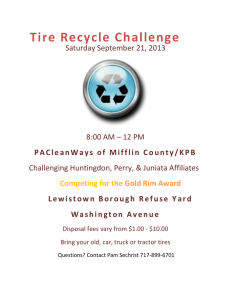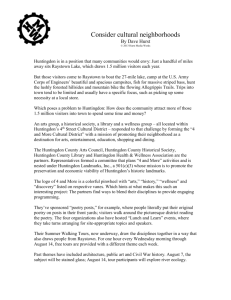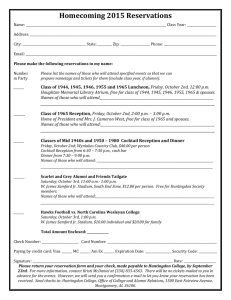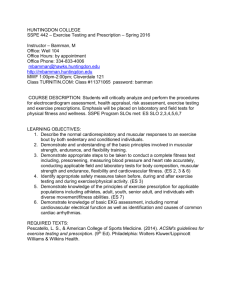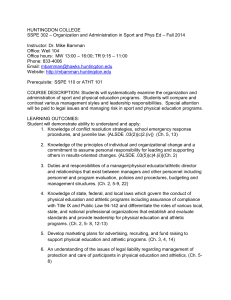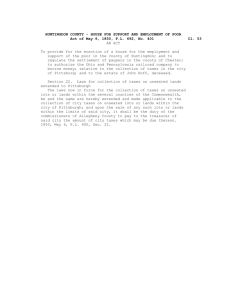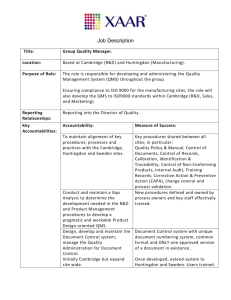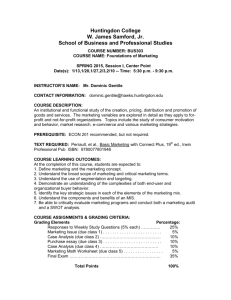President West, Provost Eggleston, Chairman honored guests, parents, grandparents, aunts, uncles,
advertisement
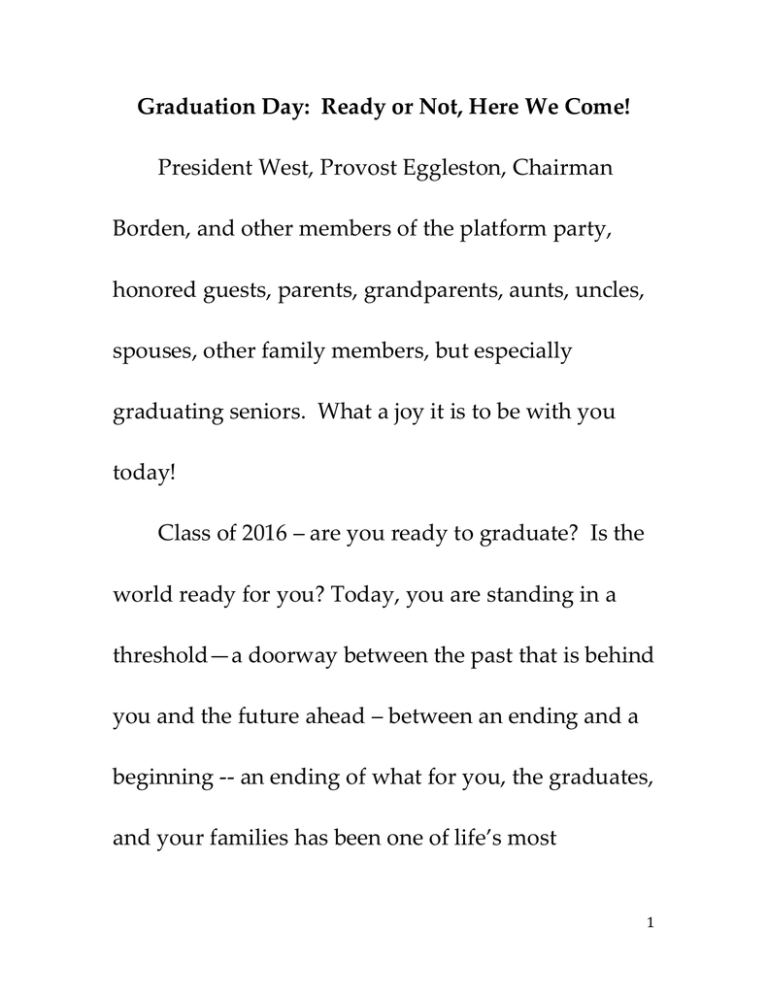
Graduation Day: Ready or Not, Here We Come! President West, Provost Eggleston, Chairman Borden, and other members of the platform party, honored guests, parents, grandparents, aunts, uncles, spouses, other family members, but especially graduating seniors. What a joy it is to be with you today! Class of 2016 – are you ready to graduate? Is the world ready for you? Today, you are standing in a threshold—a doorway between the past that is behind you and the future ahead – between an ending and a beginning -- an ending of what for you, the graduates, and your families has been one of life’s most 1 significant, and expensive, experiences. And a beginning of the important role you will play as a Huntingdon graduate in your communities, your nation, and the world. Some of you may have been pushed to come today – to attend this ceremony that didn’t seem all that important. But I want to tell you – this is really a big deal. Did you know that only six to seven percent of the world’s population has a college degree of any kind? This experience is one that you’ll never forget – you may forget every single thing I say, or every single thing President West says, but you won’t forget this day! 2 You probably know that a commencement address is one of those obligations of graduation – one that you have to sit through politely even if you’re overdressed, hot, and pretty much ready to just walk across this platform. I want to reassure you that President West has given me a time limit – and unlike some Methodist preachers I know, I’m going to stick to it. At this point we have about 18 minutes to go. To begin, let me tell you about how my life intersected with President West (or as my husband and I call him, Cam). Cam married my husband John Gardner and me in the year 2000 in our living room in 3 Pisgah Forest, NC. Before then, but especially since, we have maintained a strong friendship with both Cam and his wife Elizabeth, and through them we have watched the amazing growth and development of this College. The last time we were here on campus was in 2004 when Cameron West was inaugurated as your president, and believe me, Huntingdon is a very different and more vibrant place now than it was then. Wherever you go when you leave here –Alabama, another state, or somewhere else in the world, you will be known, respected, and enviedas a Huntingdon graduate, and 4 that reputation will place you in roles of leadership in wherever you go. Not only have my husband and I kept up with the progress of the College, we have also learned a great deal about you. Cam has kept us up to date— first, on your amazing roster ofinternships in which you were able to connect your learning with work. Raise your hand if you participated in an internship. More recently the President’s office has shared with us your plans after graduation. I congratulate you for having a plan – plans are so important, but before I forget it, I want to reassure you that if the plan you have right this minute doesn’t work out exactly like 5 you thought it would, that’s okay too. The reason it’s okay is that you have developed at Huntingdon the skills of persistence, flexibility, and leadership. These are skills you will be able to pack up and take with you wherever your life goes.Huntingdon has been very intentional inpreparing you not merely for a job but for a life calling - a wayfor you to live out your values and sense of purpose. And while we’re talking about plans, let me confess to you that when I was a student at Duke University back in the 1960s, I had no plans for a career after college. In all honesty, for college women in the 1960s, future plans for employment weren’t all 6 that important. Almost every woman’s secret dream was to find a husband, preferably a rich husband, to take care of her – we called it the “MRS” degree – by the way, that was, and still is, a very risky dream! I had grown up and gone to a small high school in a small North Carolina town. I did well in high school, but my first year of college was a mess. College courses were very hard for me – especially in math. I saw my first D’s – I had never seen one of those before – in calculus and in bowling – and at the end of my second year I actually dropped out and, surprise, surprise, got married. Not to this guy but to someone else. (I won’t give you any more detail 7 about that.) I stayed out of college for 10 years and during that time had three children and a ton of temporary jobs. When I think back on that 10-year period, I learned a great deal – not from books but from life, and much of that learning stays with me today. What I did was to walk through every open door – to trust myself to go where life seemed to be leading me. I finally returned to Duke when I was 30 years old with a good bit of work experience under my belt,much of it acquired by chance – by walking through those open doors – and at that point I never stopped until I became “Dr. Betsy Barefoot” – not a 8 real doctor, but a doctor of higher education. That took me another 18 years. Needless to say, I really loved being in college. Actually, if someone would pay me to go back to college today, I probably would. Maybe some of you would like to hang out here a bit longer, to postpone the ending. Maybe you’re a little reluctant to enter “the real world” where the stakes are higher. But the real world, whether it's the military, a job, graduate or professional education, is knocking on your door and welcoming you to cross the threshold. Whatever your feelings at this moment as your college career comes to at least a temporary close – 9 joy, relief, sadness – you’re beginning a whole new phase of learning. And inevitably you will learn more after you leave Huntingdon than you learned here. Huntingdon has given you a platform, a springboard for lifelong learning, practice in thinking critically about our crazy world. And it has given you a set of values. I’m going to return to the topic of values but before I do, let me introduce you to some other ideas – the first of them is the whole notion of being in transition. My husband, John, and I are two scholars who study the theme of transition before, during, and after college – what it’s like to move from one stage to 10 another – the fears, feelings, and reactions that are common among all of them. Do you remember your first day here at Huntingdon? Unless you were really unusual, you were probably a little scared of what was going to happen to you, a little uncertain about whether you had made the right decision in coming here, terrified that you were going to fail something – you didn’t know what – afraid that you wouldn’t have any real friends, and you were likely looking around for someone, maybe a faculty or staff member or an experienced student, whowould show you the ropes. 11 Some of you might have experienced a special transition by being the first member of your family to go to college. If you were the first in your family to attend college, raise your hand. Let me give my special congratulations to you and your families and predict that although you were the first, you won’t be the last. You have opened the door for sisters, brothers, nieces, nephews, children, and grandchildren who will follow your lead. Leaving college is another transition. Whatever your plans for tomorrow or the months to come, you’re probably going to have many of those same feelings – a little fear, some anxiety, and a desire for 12 someone to take you by the hand and show you the way. These feelings are normal and will pass. It’s important for you now to have faith in yourself – to know that you can be successful, no matter where life takes you. It’s not blind faith in the future, but faith based on all the experiences you have had in the past. Another concept I want to explore with you and that is your mindset – what you believe about yourself and how, if those beliefs areset in stone, they can actually hold you back.The topic of mindset isgenerating a lot of buzzthese days – everyone from school teachers to college professors is talking about mindset. Researchers who study mindset believe that 13 many of us grow up with a fixed mindset – certain assumptions about ourselves that have been influenced by early experiences and messages from our family or friends. If you have a fixed mindset, you will believe that there are certain things you always do well and other things that you’ll never be able to do, no matter how hard you try. People with fixed mindsets believe their success or lack of success isn’t really influenced by effort. They are terrified of failure and will only try those activities in which they know they will succeed. If you have a fixed mindset, the real problem comes when you fail at doing something you always 14 thought you could do easily.I’m not asking for a show of hands, but did any of you fail a test or exam here at Huntingdon? Did any of you ever miss a shot or a goal on a Huntingdon team? How did you react? Were you surprised or frustrated? Did it stop you in your tracks? Did it take away your motivation, at least for a while? Or did you redouble your effort?Given the fact that you’re sitting here, one thing is certain: you didn’t quit. You were persistent and resilient and you gave it another try. Graduates, your mindset will also affect your life after college – there will come a time when things don’t go well for you – when you might make a 15 mistake, be treated unfairly, lose a job, disappoint yourself, or disappoint others. Your ability to be resilient, to learn from what goes wrong in your life, to stay the course and not give up will determine how you ultimately write your own life story. As you think about the members of your family, I bet that each of you could name people who were and are examples of resilience. Thank them for showing you the importance of not giving up –they have helped make you the person you are today. Now one other essential part of any commencement speech is advice-giving. I have to confess to you that I don’t give a lot of advice these 16 days, unless I think it’s absolutely essential. So in selecting some advice for you, I worked hard to pick six ideas that I really think will make a difference as you go forward.So, here’s number one: 1. Stop waiting on others to solve the world’s problems. Whether they’re here in Montgomery or in Washington, or on the campaign trail, we’re finding that many individuals who call themselvesstate or national leaders have feet of clay. They disappoint us all the time. So to quote the columnist, Arianna Huffington, turn to the leader in the mirror and tap into your own leadership potential rather than relying on others to make the world right. 17 2. Don’t let whatever fearthat is lurking in your head get in your way. The French philosopher, Montaigne put it like this, “There were many terrible things in my life, but most of them never happened.” Push down those little nagging fears – refuse to let them stop you from doing what you want to do. Power through them and you’ll likely see them disappear. My own grandmother used to say, trust more and worry less. Sounds easy, but if you’re a worrier, and you know who you are, it can be a struggle. 3. Practice commitment. Hopefully in your life and your family’s life, you’ve seen examples of 18 commitment. Commitment is what turns a promise into reality. In today’s world, it’s easy to avoid commitment – to believe that the grass will be greener in another place or with another person. But without commitment to a person, a faith, a purpose, you’ll always be living a tentative life – a life with one foot out the door. 4. Keep learning. If you thought that college graduation was the end of learning, think again. It is really just the beginning. Take advantage of every opportunity you have to learn, to challenge yourself. If you haven’t already thought of continuing your education in graduate school, think of it as a 19 possibility. I learned through my own weird educational experience, that the older I got, the more I learned, and the more I enjoyed learning. 5. Give thanks. It’s tempting to think that you’ve done everything yourself – through your own abilities. But every single individual here this afternoon has benefitted from the support of someone else. Perhaps it was a minister in your church, a high school teacher, a coach, a family member, or someone you met here at Huntingdon. If those people are still living, thank them. Start immediately. Before you leave this place, thank every faculty or staff member who helped and supported you. Thank the President, 20 the Provost, your parents, and other family members. You know, they really care about you. And make giving thanks a life-long habit! 6. Finally, I hope you will continue to explore and deepen your faith, your beliefs, your most basic values, and your understanding of the creator. That understanding may change over time. Mine has, thankfully. My childhood God was a sort of magical genie, a bearded old man with whom I could make bargains and who would inevitably get me out of trouble if I made sure to be inSt. Paul Methodist Church on Sunday and to put a quarter in the collection plate. But remember 1st Corinthians, 21 Chapter 13, “When I was a child, I spake as a child, I understood as a child, I thought as a child, but when I became a man (or woman), I put away childish things.” What will that mean for you? Since everyone’s spiritual journey is unique, I only know what it has meant for me. For me,at this time in my life,my spiritual beliefs are centered in the power of love, forgiveness, and reconciliation. Graduates, you have been blessed to be students at Huntingdon College. You now have the stamp of the College on your forehead – perhaps it’s invisible to the naked eye, but it’s there.You are different from the person you would have been if you had gone to 22 the University of Alabama, Auburn, or Alabama State. You have lived, studied, and played in an environment based on a distinct set of values that are consistent with the Judeo-Christian faith and the United Methodist Church, and because you were here, you will never be the same. How have you changed? Let me quote President West as he reflected in 2008 on how being at Huntingdon College would influence and even transform students who studied here. And I quote, “My goal for Huntingdon students educated in the liberal arts is for them to think critically and morally, to communicate with clarity 23 and civility, and to extend themselves in service far beyond their own backyards.” Graduates, this is your charge: What will it mean for you to think critically, to apply a moral yardstick to all your decisions? What will it mean in your neighborhood or your home for you to communicate clearly and in a civil manner? And what will it mean for you to lose your own self-interest in service to others? Only you can answer those questions. You are officially ready to live those Huntingdon values, to take on the world! You are Huntingdon College – now and in the future. God bless each of you. God bless Huntingdon College. 24
